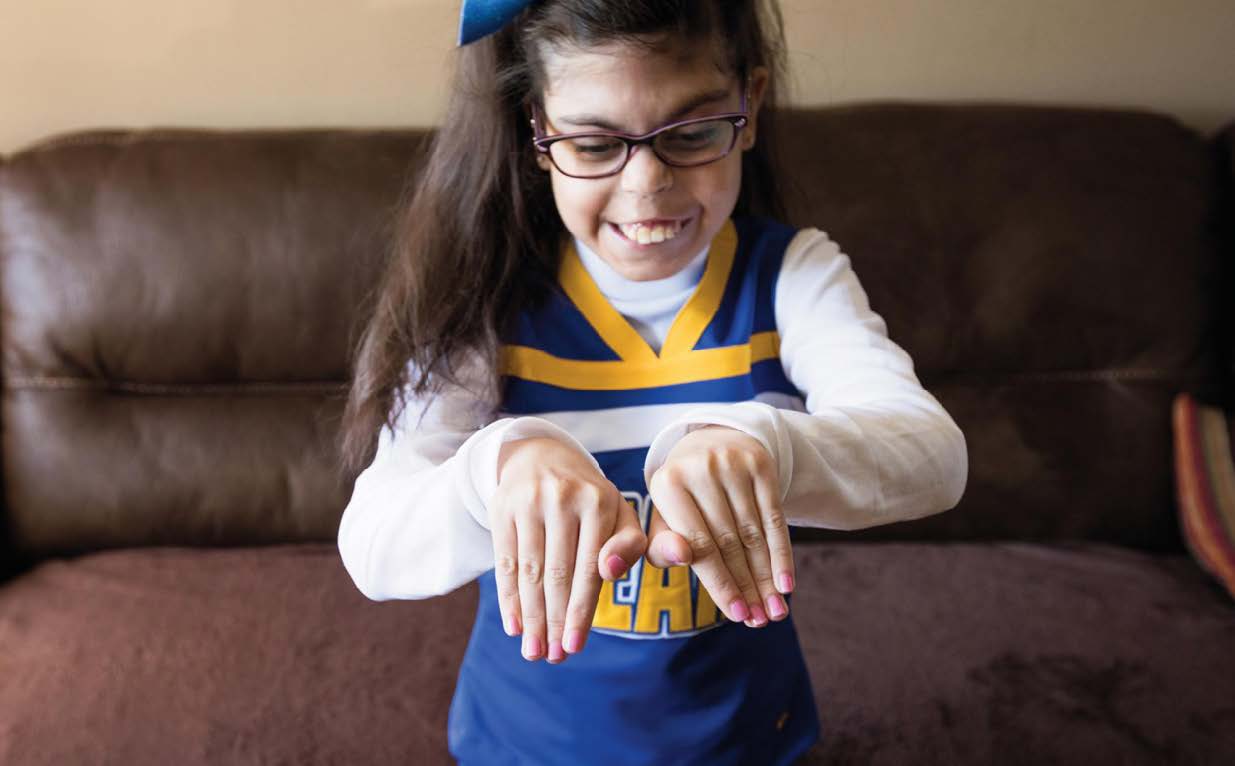Acclaimed portrait photographer Karen Haberberg has turned her lens on families raising children with rare genetic conditions in a book, An Ordinary Day: Kids with Rare Genetic Conditions.
One in 10 Americans is affected rare genetic diseases, while 95% do not have an FDA approved drug treatment. An Ordinary Day connects families with children who have rare disorders to one another – and to the world.
Moments captured in the Lives of Extraordinary Families Raising Children with Rare Diseases

HEROIC SPIRIT: Ethan has two paternal 15th chromosomes, a rare form of a genetic disorder known as Angelman syndrome. Ethan does not sleep very much, has seizures, and can get frustrated when trying to communicate. His hands sometimes flap and he occasionally makes unexplained noises. Regardless of these symptoms, children with Angelman are known to have a generally happy demeanor. Ethan is no exception; he is constantly laughing, hugging, and smiling. Ethan loves water and playing with his brothers and on his iPad.
Through dozens of powerful images and candid interviews, readers will fall in love with these children, sharing in their struggles and celebrating their victories. Despite the complexity of their individual circumstances, the book captures family life in all its simplicity and humanity. Haberberg finds beauty in the common threads that unite us all. An Ordinary Day dis"An plays photographs set against intimate conversations, presenting the stories of 27 courageous families living with children with rare genetic conditions. Readers will fall in love with each child while celebrating the life-affirming spirit captured in every image. These brave children include Ethan, a mute child, as he learns to make his first sound; Jonathan, a nine-year-old, as he finally is able to eat with a spoon and; Maddy, a five-year-old, as she takes his first step after years of crawling. These are all tasks that are taken for granted by families and children without these disorders, but are immense accomplishments and triumphs for children with rare genetic diseases.
The everyday moments captured in An Ordinary Day look to inspire awareness and empathy, while highlighting the commonalities between families with rare genetic conditions, and more deeply between us all. An Ordinary Day illuminates the meaning of family. With sales benefiting genetic research, the book releases Oct. 17, 2017 by powerHouse Books.
"An Ordinary Day" iluminates the meaning of family.
ABOUT THE AUTHOR:Karen Haberberg is a New York City-based portrait photographer. Her photography has been shown in numerous gallery exhibitions, magazines, and newspapers including The New York Times, Wall Street Journal, The Daily News, Huffington Post, Time Out NY, Daily Mail, Cosmopolitan, New York Family and Fit Pregnancy. Her work was recently featured on ABC News and NY1. In addition, Haberberg teaches photography at the 92Y and JCC of Manhattan. For nearly a decade, she served as the Director of Photography and Digital Media at the Jewish Community Center in Manhattan, where she spearheaded photography related programming for children and adults. Haberberg has also curated numerous exhibitions and collaborated with wellknown photographers such as Annie Leibovitz, Elliot Erwitt, Joyce Tenneson, Gillian Laub, Bruce Davidson, among others. Haberberg holds a BA from Brandeis University and earned her MA in Art and Photography from the ICP. She lives in Manhattan with her husband and two children Maya and Liam. For more information, visit her website at karenhaberberg.com

GOOD CHEER: At just 20 weeks, while in utero, Gianna was diagnosed with 22q11.2 deletion syndrome. At just three days old she had nasal surgery, and then at two months old, heart surgery. To date, she has had 26 surgeries. Gianna, 14, suffers from seizures, feeding and swallowing issues, growth deficiency, bowel and bladder incontinence, cognitive delays, OCD, ADD, and Tourettes spectrum, among many other things. Despite this, Gianna is always enthusiastic; her favorite activity is cheering.
STRUGGLES AND VICTORIES
Q&A with Karen Haberberg
Q: How did you decide to photograph families raising children with rare genetic conditions?
A: "An Ordinary Day" was a labor of love for me. My parents lost a child to Tay Sachs disease before I was born and almost 50 years later, they still suffer from the loss of my brother, Rafi. More recently, my best friend's son was diagnosed with Angelman syndrome. Hearing her struggles and victories made me realize how little attention families who have children with rare genetic conditions receive and how common it actually is. One in 10 families in America has a child with a rare condition and 95% of those conditions do not have one single FDA approved drug treatment
Q: In your book, you captured some incredibly intimate moments between parents and their kids. How did you gain their trust to tell their personal stories through photography?
A: All the families in the book are extraordinary. I am incredibly fortunate to have been allowed into their intimate world. I am in awe of their strength, optimism and perseverance. I was there to tell their story as authentically as possible, and I think they felt that, which is what enabled them to open up to me. I deeply care about each family represented in the book, and find found them to be incredibly inspirational.
Q: What was the best and most difficult parts of working with the kids and families featured in your book?
A: It's been an honor and privilege to work with each of the families, but given the topic, there were some difficult moments emotionally during the interviewing process. While we may have shed a few tears together, their honesty and my empathy was a beautiful thing. I only want the best for these kids, and I think the parents recognized that.
Q: Have your own kids shown interest in photography? What did they think about the project?
A: Have your own kids shown interest in photography? What did they think about the project? My kids are at the age that they most appreciate photographs of fuzzy animals or landscapes. The most important thing I want my kids to come away with from this project is how impor tant it is to accept all kinds of people. They know that no one is perfect and we are all working on things. It's critical that they don't judge, shy away from, or exclude kids who are different. I they got that message now.
Q: What is somethin you would like to communicate to people who have not spent a lot of time around kids with special health needs?
A: Many of the parents in the book comment that most of the people they socialize with since their child was diagnosed are from the rare genetic disease community. Their friends with typical kids no longer invite them to parties because they worry that if the kids with a rare condition attends the birthday party and the kid has an outburst or a behavioral issue, the party will be ruined. It's a shame because the families who have kids with rare genetic conditions already feel isolated. They are already struggling with medical insurance companies, schools and everyday life. People haven't who been closely exposed to families like these are often ignorant and fearful, which is what causes them to step away rather than lean in. It's time we lean in. We need to teach tolerance to all ages.,
Q: Deep emotion radiates through the images you captured. Were you ever emotionally overwhelmed during the project? How did you handle that?
A:There were definitely more than a handful of moments when parents were talking to me candidly that I choked back some tears. Watching these kids and families repeatedly work as hard as they do to learn basic skills and move forward, which could be as simple as eating, was heartbreaking at times. These families persevere because they have to, but they do it with such profound grace that it's astonishing; I deeply respect them.
A: handful of the families have started their own organizations to raise money and awareness for their child's condition and have really helped propel forward research in their specific areas.
Q: Rare Disease Day will be observed on Feb. 28, 2018, to help spread worldwide awareness of uncommon health conditions. What are some ways people can show their support and make a difference in their own communities?
A Global Genes does an amazing job at advertising different ways to spread the word about rare genetic conditions and support the cause.
Q: Last thoughts ?
A: When I returned home after each shoot I always gave my kids an extra strong hug and reminded myself – don't sweat the small stuff. Be grateful, and I am.•
ABOUT AN ORDINARY DAY:
Life can present challenges that seem insurmountable. Children are not exempt from this, but often through their innocence and willpower we can find inspiration and hope. An Ordinary Day features unforgettable photographs set against intimate conversations, documenting the lives of 27 children living with rare genetic conditions. The book invites us to connect with kids like Ethan, a nonverbal seven-year-old who learns to sign to communicate his needs, five-year-old Madison who has taken her first steps after years of crawling, and Jonathan, a nine-year-old boy who finally learns to eat with a spoon after many failed efforts. Tasks often taken for granted, are profound triumphs for children afflicted with rare genetic conditions. The everyday moments captured in An Ordinary Day inspire awareness and empathy, while highlighting the commonalities between us all. Poignant and revelatory, An Ordinary Day illuminates what it means to be a family.
